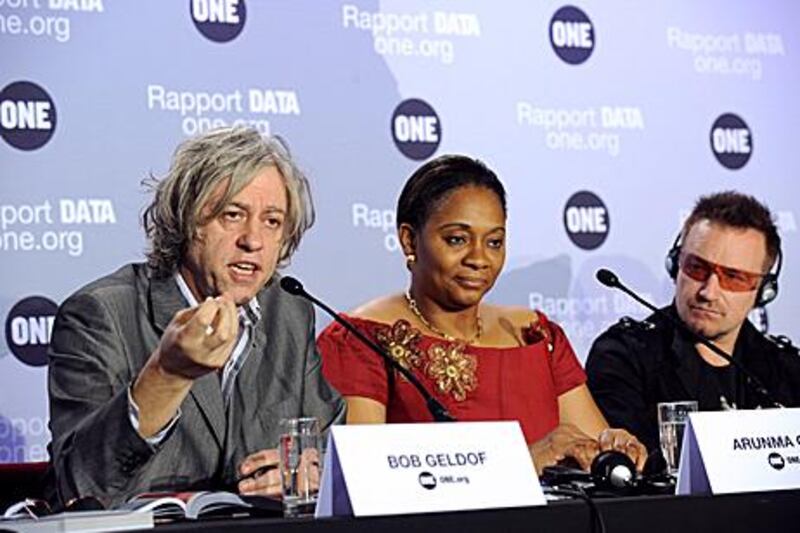A World Bank executive believes the continent is the next 'big idea'. Two Irish rockers, themselves renowned for big ideas, show the perils and rewards of investing there As one Irish rocker arrives with more cash for Africa, another is taking his out and moving to China. Bob Geldof is to lead a US$1 billion (Dh3.67bn) equity fund that he says is going to take advantage of the continent's economic emulation of the so-called BRIC economies - Brazil, Russia, India and China.
Bono, meanwhile, is quietly phasing out African production of garments for Edun, the fair trade fashion house he and his wife, Ali Hewson, set up five years ago. After consuming $20 million, Edun has yet to turn a profit, beset by quality and cost problems. The fortunes of the two Irish pop stars, both who have invested considerable effort and time into promoting the African cause, is perhaps the clearest indication of the perils and rewards of investing in the continent.
In spite of its vast social problems, things have been looking up for the world's second most-populated land mass. In an upbeat report, Ngozi Okonjo-Iweala, the managing director of the World Bank, says Africa as a BRIC is the next "big idea". Most African countries are better off than they were a decade ago. Collectively, GDP rose from a pedestrian 3.4 per cent for most of the 1990s to 5.4 per cent in the years up to the global economic slowdown. Per capita growth went from 0.7 per cent to 2.7 per cent in the same period. Inflation today is half of what it was before 2000, says Mr Okonjo-Iweala.
Only a handful of its leaders are still ranked as despots, compared with two thirds regarded as tyrants in the 1980s. People are another of the continent's strengths. Education has improved both in terms of the number of children being taught, as well as quality. And, most significantly, there are more of them; Africa's population is catching up to BRICs, which have vast numbers of people - more than a billion each in the case of China and India. More people means more consumers, something that plays a significant part in investment decisions.
Geldof is hoping to tap into this with the fund he is fronting, tipped to be one of the biggest private equity investors in Africa. Of course, the idea of Africa-as-BRIC comes with a big "but". The clearest hurdle is that the continent is not a single country but 47 (or 53 if you include offshore island states such as Madagascar). Each has its own government, bureaucratic rules and tax regime. Wildly different levels of development are also a complicating factor. South Africa may be the economic giant of Africa, but across the border its neighbour Zimbabwe is rapidly approaching failed-nation status.
Investors therefore must make country-by-country decisions, rather than treat Africa as a single market. Kenya may be inviting to many investors, but its war-torn neighbour Sudan will be given a pass by most. Fifteen countries are entirely landlocked, which means they depend on a spotty road system or air for their imports and exports, which adds considerably to costs. Border posts are notoriously difficult to pass through, rife with corruption and inefficiency.
Yet the future in Africa may well belong to the Geldofs rather than the Bonos, after all. Socialist holdouts are few and the continent has more or less embraced free market capitalism. A new generation of African leaders are open to talks on free trade zones and co-operation with their neighbours. As for the BRICs, all have pressing social problems of their own, from widespread poverty in India to rampant corruption in Russia. These have not stood in the way of significant economic progress.
Perhaps Africa could do the same. It would be nice to think that in the future when musicians come to Africa it will be to perform as artists to a stadium full of fans, instead of with cameras in tow and care packages for starving children.
business@thenational.ae





